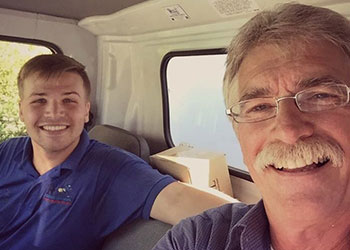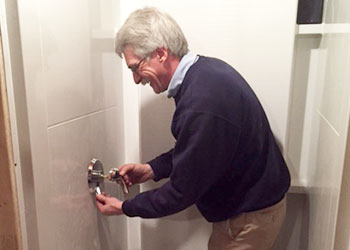Winter is tough on a lot of things in our lives. Our vehicles, schedules and peace of mind can all take a beating. Plumbing is another aspect that is heavily affected by winter's freezing temperatures, howling winds and unpredictability. We've put together some tips to help protect your home's plumbing system and tricks on how to handle the unexpected.
 Burst plumbing mess in Columbia CT
Burst plumbing mess in Columbia CT
Preventative winter plumbing tips
- Keep the heat up. It's tempting to conserve on energy costs and turn the thermostat way down when you aren't home or when you're sleeping. However, it won't be much of a savings if a pipe bursts! Keep your thermostat set at at least 68 degrees. This will also keep your heating system running more efficiently. It won't have to work so hard, especially when the temps dip, to bring your home back up to temp.
- Disconnect outside hoses. If you haven't already done so, do it now! Any water left in a hose will freeze. Once it freezes, it expands and will lead right up into the spigot. Eventually, it will run out of room to expand and burst the plumbing pipe.
- Schedule cleanings. Be sure to keep up with regular furnace and chimney cleanings, as well as burner service. Vacuum pet hair and dust from your baseboard heat registers. Routine maintenance prevents emergency repairs AND keeps your loved ones safe. Carbon monoxide deaths are highest in the winter.
- Check fuel levels. Auto delivery is great but don't depend on it. It's only based on an estimation of what you will use. There may be a hard freeze that lasts for days, and you'll burn through more oil than you think. Plumbing pipes can burst if you run out of oil in the middle of the night, and the heat shuts off.
- Run faucets at a drip. Does your plumbing run on an outside wall? If the forecast calls for a deep freeze, open up those faucets. Running both the hot AND the cold sides at the slightest drip will prevent your plumbing pipes from freezing. It should not run your well dry or run up your water bill excessively. The cost is *TINY* compared to a plumbing bill.
Emergency plumbing tips
- Do NOT use a blow torch. If you suspect that you have a frozen pipe, do NOT use an open flame source to thaw it. The best way to thaw a frozen pipe is to do it LOW AND SLOW. A hair dryer is a great tool. If the pipes are in a cabinet, open up the doors to let your home's heat circulate around them. Run the faucets, so that when the water does thaw, it has somewhere to escape.
- Know where your shut-off valve is. If a plumbing pipe bursts, you need to shut the water off to your home to keep damage at a minimum. This video will show you what the shut-off valve may look like and how to use it. Most shut-offs are in a basement or utility room.
- Call a professional. The first rule of DIY is to know when you're in over your head. Calling a professional can mean a quicker, lasting repair. When gas is involved, a professional should always be contacted.























